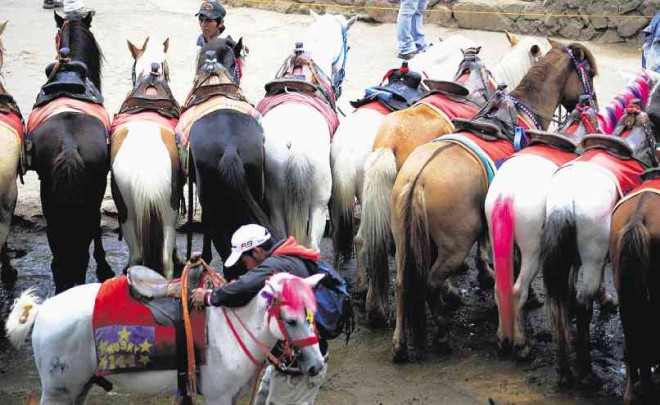Ibaloi ready to discuss terms over ancestral land

THESE horses draw tourists to the Wright Park in Baguio City, which was recently the subject of controversy when a government agency granted an ancestral land title to an Ibaloi family that incorporates this tourist destination. EV ESPIRITU/INQUIRER NORTHERN LUZON
BAGUIO CITY—Ibaloi families holding ancestral land titles are ready to discuss with the city government how they propose to use their property to reduce the friction that the Certificates of Ancestral Land Title (CALT) have generated between indigenous peoples (IP) and the public, a city official said.
Councilor Isabelo Cosalan said the offer was made in August last year after the city government questioned the validity of the CALT whose coverage encroaches on the presidential Mansion reservation, the Wright Park and the Forbes Park here.
Meeting with families
Cosalan, a member of an Ibaloi family in the city, said allowing the IP families to take part in land use planning for Baguio City would help harmonize the interests of the city and its indigenous groups.
National Commission on Indigenous Peoples (NCIP) Cordillera director Amador Batay-an said his agency has scheduled a meeting of Baguio families holding problematic CALT to address the city government’s objections.
Article continues after this advertisementNCIP issues the CALT as mandated by Republic Act No. 8371 (Indigenous Peoples’ Rights Act of 1997). This certificate represents individual lands belonging to generations of IP clans.
Article continues after this advertisementRecently, Felix Mariñas Jr., president of the Natural Resources Development Corp. (NRDC), augmented the security at Casa Vallejo, the city’s oldest hotel, when the National Commission on Indigenous Peoples (NCIP) allowed an Ibaloi family to acquire the property.
NRDC, the corporate arm of the DENR, administers the Casa Vallejo, which had been restored and leased by a developer in 2009.
The writ of possession was granted to the descendants of Ibaloi clan leader Piraso, according to the DENR, which had asked the Office of the Solicitor General (OSG) to intervene.
On Jan. 7, OSG lawyers also faced the family of the late Josephine Abanag, a descendant of another Ibaloi clan leader, Menchi.
Last year, the Abanag family petitioned the NCIP to stop the construction of a building of the government-owned People’s Television Network at a portion of the Cordillera House, which is within the Mansion’s reservation. This area is inside the Abanag CALT.
Succession of titles
OSG lawyer Ma. Dolores Rigonan and other government officials presented documents to argue that the national government owned the Mansion compound, including the Cordillera House.
The titles, laid out by the Register of Deeds before an NCIP hearing, show a succession of national government titles over the Mansion property from 1902, when the American colonial government reigned, to 1942, during the Commonwealth era.
Authenticity
Lawyer Manuel Cuilan, who represented the Abanag family, challenged the authenticity of the titles and noted that the documents did not have technical descriptions.
Cuilan also said the titles would have been invalidated when the Commonwealth government was terminated in 1946, after the Americans recognized the Philippines’ independence at the end of World War II. Vincent Cabreza and Desiree Caluza, Inquirer Northern Luzon